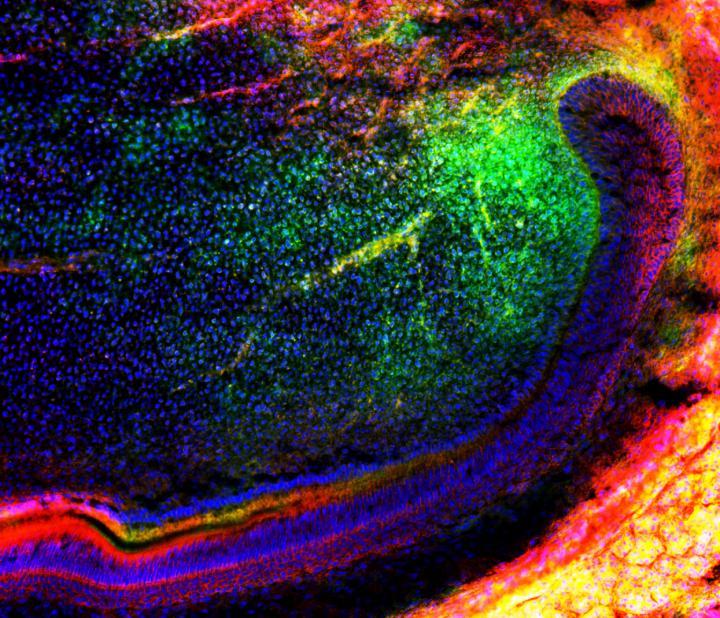A new method of tooth repair? Scientists uncover mechanisms to inform future treatment

Pictured is a group of mesenchymal stem cells (traced in green) migrating into a tooth to further regenerate the tissue and organ Credit: University of Plymouth
Stem cells hold the key to wound healing, as they develop into specialised cell types throughout the body – including in teeth.
Now an international team of researchers has found a mechanism that could offer a potential novel solution to tooth repair.
Published today (Friday 9 August) in Nature Communications, the study showed that a gene called Dlk1 enhances stem cell activation and tissue regeneration in tooth healing.
The work was led by Dr Bing Hu from the University of Plymouth's Peninsula Dental School, with collaboration from researchers worldwide.
*The science behind the discovery*
Dr Hu and his team discovered a new population of mesenchymal stem cells (the stem cells that make up skeletal tissue such as muscle and bone) in a continuously growing mouse incisor model. They showed that these cells contribute to the formation of tooth dentin, the hard tissue that covers the main body of a tooth.
Importantly, the work showed that when these stem cells are activated, they then send signals back to the mother cells of the tissue to control the number of cells produced, through a molecular gene called Dlk1. This paper is the first to show that Dlk1 is vital for this process to work.
In the same report, the researchers also proved that Dlk1 can enhance stem cell activation and tissue regeneration in a tooth wound healing model. This mechanism could provide a novel solution for tooth reparation, dealing with problems such as tooth decay and crumbling (known as caries) and trauma treatment.
Further studies need to take place to validate the findings for clinical applications, in order to ascertain the appropriate treatment duration and dose, but these early steps in an animal model are exciting, as Dr Hu explains.
*What the authors say*
Dr Hu, who is also part of the University's Institute of Translational and Stratified Medicine (ITSMed), said: “Stem cells are so important, as, in the future, they could be used by laboratories to regenerate tissues that have been damaged or lost due to disease – so it's vital to understand how they work.
“By uncovering both the new stem cells that make the main body of a tooth and establishing their vital use of Dlk1 in regenerating the tissue, we have taken major steps in understanding stem cell regeneration.
“The work has taken place in lab models at this stage, and further work needs to be done before we can bring them in to human use. But it's a really big breakthrough in regenerative medicine that could have huge implications for patients in future.”
Professor Christopher Tredwin, Head of Peninsula Dental School and co-author of the paper, said: “We are highly excited by the recent progresses in Dr Bing Hu's group. This new work, together with a recent high-impact paper published in The EMBO Journal (doi: 10.15252/embj.201899845), which is about another type of stem cells in the tooth: epithelial stem cells, puts Plymouth at the front of the world's dental and craniofacial stem cell research and regenerative medicine. We expect those researchers will soon provide dental patients better time and cost-effective solutions to serious tooth problems – from trauma to caries.”
###
The full study is entitled Transit Amplifying Cells Coordinate Mouse Incisor Mesenchymal Stem Cell Activation and available to view now in Nature Communications (doi: 10.1038/s41467-019-11611-0).
The work was supported by the National Natural Science Foundation of China; National Institutes of Health; the Deutsche Forschungsgemeinschaft; the European Union Marie Sk?odowska-Curie Actions; the European Regional Development Fund; and the Biotechnology and Biological Sciences Research Council.
Full list of institutions involved in the study
China: Peking University, Capital Medical University, Shenyang Stomatological Hospital and Second Hospital of Shandong University
Denmark: University of Southern Denmark, University of Copenhagen
Germany: Max Planck Institute for Molecular Biomedicine and Technische Universität Dresden
Saudi Arabia: King Faisal University
Singapore: National University of Singapore
Switzerland: University of Geneva
UK: University of Plymouth
USA: Keck Graduate Institute; and UT Health San Antonio
Media Contact
More Information:
http://dx.doi.org/10.1038/s41467-019-11611-0All latest news from the category: Health and Medicine
This subject area encompasses research and studies in the field of human medicine.
Among the wide-ranging list of topics covered here are anesthesiology, anatomy, surgery, human genetics, hygiene and environmental medicine, internal medicine, neurology, pharmacology, physiology, urology and dental medicine.
Newest articles

NASA: Mystery of life’s handedness deepens
The mystery of why life uses molecules with specific orientations has deepened with a NASA-funded discovery that RNA — a key molecule thought to have potentially held the instructions for…

What are the effects of historic lithium mining on water quality?
Study reveals low levels of common contaminants but high levels of other elements in waters associated with an abandoned lithium mine. Lithium ore and mining waste from a historic lithium…

Quantum-inspired design boosts efficiency of heat-to-electricity conversion
Rice engineers take unconventional route to improving thermophotovoltaic systems. Researchers at Rice University have found a new way to improve a key element of thermophotovoltaic (TPV) systems, which convert heat…



